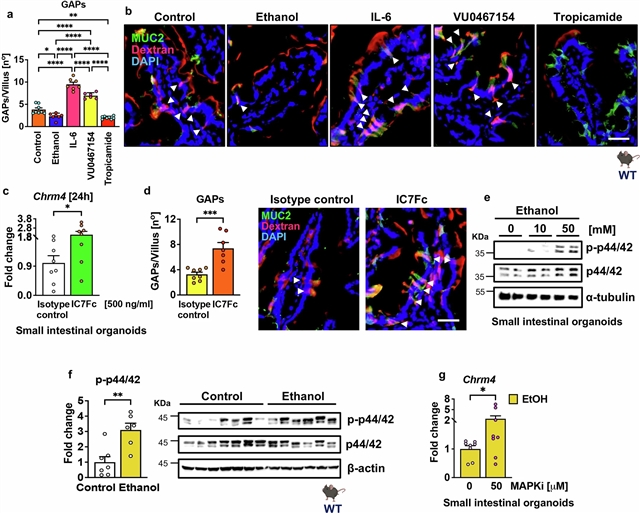
加州大学Bernd Schnabl团队的一项最新研究探明了mAChR4通过GAP诱导的抗菌免疫抑制肝脏疾病。相关论文于2025年8月20日发表在《自然》杂志上。
在这里,研究团队发现人类和小鼠的慢性酒精主题下调小肠mAChR4并减少GAP的形成,破坏抗菌免疫。这在肠道IL-6信号换能器(IL6ST,也称为糖蛋白130;gp130)激活时发生逆转,从而恢复mAChR4的表达和GAP的形成,从而诱导下游3型先天淋巴样细胞来源的IL-22和抗菌REG3蛋白。这减弱了肠道细菌向肝脏的易位,从而赋予了ALD抗性。GC特异性mAChR4激活诱导GAP对于预防乙醇性脂肪性肝炎是必要和充分的。这些结果为使用mAChR4或IL6ST激动剂通过抑制微生物易位促进GAP形成和预防ALD的治疗方法奠定了基础。
据介绍,酒精性疾病和酒精相关性肝病(ALD)是导致死亡和肝移植的主要原因。肠-肝轴在ALD发病机制中起着至关重要的作用,但人们对其知之甚少,这取决于微生物易位。肠杯状细胞(GCs)通过形成GC相关抗原通道(GAP)激活毒蕈碱型乙酰胆碱受体M4 (mAChR4,也称为M4)来教育免疫系统,使固有层抗原呈递细胞能够取样腔内抗原。
附:英文原文
Title: mAChR4 suppresses liver disease via GAP-induced antimicrobial immunity
Author: Llorente, Cristina, Raya Tonetti, Fernanda, Bruellman, Ryan, Brea, Roco, Pell, Nuria, Hartmann, Phillipp, Maccioni, Luca, Han, Hui, Cabr, Noem, Liu, Junlai, Eguileor, Alvaro, Fondevila, Marcos F., Meijnikman, Abraham S., Hsu, Cynthia L., Alghafri, Ameera, Zhou, Rongrong, Gao, Bei, Duan, Yi, Zhang, Peng, Febbraio, Mark A., Taniguchi, Koji, Newberry, Rodney D., Fouts, Derrick E., Brenner, David A., Strkel, Peter, Karin, Michael, Schnabl, Bernd
Issue&Volume: 2025-08-20
Abstract: Alcohol-use disorder and alcohol-associated liver disease (ALD) are major causes of death and liver transplantation1. The gut–liver axis has a crucial yet poorly understood role in ALD pathogenesis, which depends on microbial translocation. Intestinal goblet cells (GCs) educate the immune system by forming GC-associated antigen passages (GAPs) on activation of muscarinic acetylcholine receptor M4 (mAChR4, also known as M4), enabling sampling of luminal antigens by lamina propria antigen-presenting cells. Here we show that chronic alcohol use in humans and mice downregulates small intestinal mAChR4 and reduces GAP formation, disrupting antimicrobial immunity. This is reversed on activation of intestinal IL-6 signal transducer (IL6ST, also known as glycoprotein 130; gp130), which restores mAChR4 expression and GAP formation, enabling induction of downstream type-3 innate lymphoid cell-derived IL-22 and antimicrobial REG3 proteins. This blunts translocation of enteric bacteria to the liver, thereby conferring ALD resistance. GAP induction by GC-specific mAChR4 activation was essential and sufficient for prevention of ethanol-induced steatohepatitis. These results lay the foundation for a therapeutic approach using mAChR4 or IL6ST agonists to promote GAP formation and prevent ALD by inhibiting microbial translocation.
DOI: 10.1038/s41586-025-09395-z
Source: https://www.nature.com/articles/s41586-025-09395-z
Nature:《自然》,创刊于1869年。隶属于施普林格·自然出版集团,最新IF:69.504
官方网址:http://www.nature.com/
投稿链接:http://www.nature.com/authors/submit_manuscript.html
